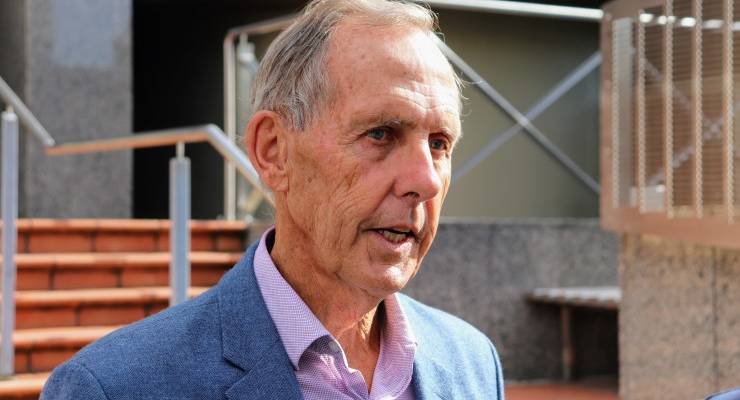
The Greens are right to demand that more than 100 coal and gas projects in Australia’s pipeline be binned in exchange for support for the government’s key climate policy in the Senate, former Greens leader and environmentalist Bob Brown says.
“The Albanese government is captured by the corporations and unions against public sentiment,” he told Crikey. “The Greens’ policy represents most Australians’ wishes.”
Greens Leader Adam Bandt has confirmed that his party, which holds the balance of power after the Coalition vowed to vote nay, had agreed to waive all other concerns with the controversial safeguard mechanism legislation on one condition.
“The Greens have huge concerns with other parts of the scheme, such as the rampant use of offsets and the low emissions reduction targets,” he said. “But we’re prepared to put those concerns aside and give Labor’s scheme a chance if Labor agrees to stop opening new coal and gas projects.
“Labor needs the Greens to get this through Parliament. If Labor’s scheme falls over, it will be because Labor wants to open new coal and gas mines.”
Of 76 senators, 26 are Labor, 32 are Coalition and 11 are Greens, with a seven-person crossbench made up of a One Nation duo, a Lambie Network duo, a single UAP senator, and two independents.
The hostage-taking position, which was agreed to by the Greens partyroom yesterday, came just hours before Resources Minister Madeleine King told Parliament that gas would be needed “for a number of years” as Australia mines renewable technology ingredients such as lithium and cobalt.
“We want to increase activity in renewables and we have a commitment to net zero emissions by 2050, but even as the International Energy Agency has acknowledged, we will still need to use products such as gas to make sure we can process critical minerals,” King said.
Brown said that despite boasting its climate credentials, the government is completely out of touch with voters. Almost two-thirds (63%) want to ban all new coalmines, a 2022 Lowy Insitute poll found. A third (33%) support subsiding new coal-fired power plants.
“A higher proportion [than two-thirds] wants to stop logging of native forests,” Brown added.
Is it CPRS 2.0?
Brown is no stranger to holding one’s ground on climate policy. It’s nearly 15 years since the Greens voted against Rudd-era carbon pollution reduction scheme (CPRS), which Labor claim kicked off a decade of government inaction on climate change.
In 2019, Defence Industry Minister Pat Conroy — who was then the Labor spokesman for climate change — declared the Greens’ veto a “massive error of political judgment”.
“It has had disastrous and long-lasting consequences for Australia’s ability to respond effectively to climate change,” he said.
Labor said the CPRS would have slashed 218m tonnes in cumulative additional emissions between 2010 and 2020, and lashed the Greens for voting “against a mechanism putting Australia’s emissions on a downward trajectory”.
Labor has rose-coloured glasses: expert
University of Sydney political academic Rebecca Pearse said the cap-and-trade scheme was hardly the silver bullet that Labor might like to remember it as — it would have had a “negligible impact on fossil fuel extraction, partly due to overly generous compensation arrangements for miners”.
No one was happy with CPRS, she wrote for The Conversation in 2019: environmentalists saw emission targets as too low; the industry saw the compensation as too low; the Greens along with many economists and most environmental groups opposed it. She wrote at the time that Labor sought to leverage the scheme for short-term political gain.
However, Pearse told Crikey that her initial impression is that the Greens’ parliamentary position on the safeguard mechanism is not a repeat of the party’s 2009 approach.
“One way to look at the Greens’ strategy is to see them as reminding the government to answer basic questions about the future of key fossil fuel industries any climate policy reform should be able to answer,” she continued.
“This line of questioning is democratically useful. Some clarity and certainty is important for industry and communities alike.”
Are the Greens doing the right thing? Let us know by writing to letters@crikey.com.au. Please include your full name to be considered for publication. We reserve the right to edit for length and clarity.








Crikey is committed to hosting lively discussions. Help us keep the conversation useful, interesting and welcoming. We aim to publish comments quickly in the interest of promoting robust conversation, but we’re a small team and we deploy filters to protect against legal risk. Occasionally your comment may be held up while we review, but we’re working as fast as we can to keep the conversation rolling.
The Crikey comment section is members-only content. Please subscribe to leave a comment.
The Crikey comment section is members-only content. Please login to leave a comment.